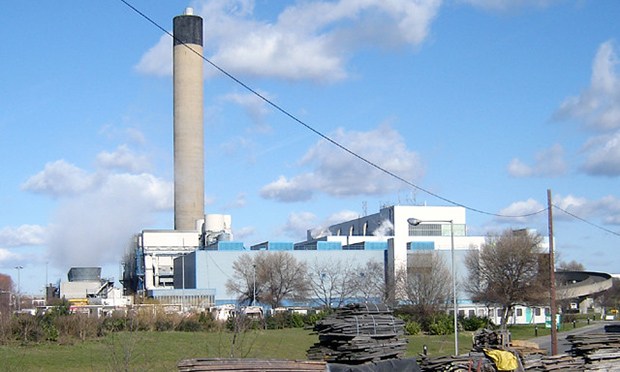Extinction Rebellion writes to over 400 councillors asking for halt to Edmonton incinerator

Extinction Rebellion (XR) has written to over 400 councillors across seven London boroughs asking for an “immediate pause” to the construction of a new incinerator in Edmonton and setting a deadline for action of 20 May.
The environmental campaigners are also asking for an independent review of the £1.2bn replacement to the current incinerator, and are proposing environmentally-friendly alternatives to the burning of waste, such as mechanical and biological treatment and distributed modular gasification.
Pressure is building politically in Hackney to accede to XR’s “respectful call” to the seven councils that come under the North London Waste Authority, with both constituency Labour parties in the borough recently passing their own motions to pause and review.
An XR spokesperson said: “While we appreciate that local authorities are on a tight budget due to national government policy, we have no doubt that councils can combine fiscal responsibility with sustainability when dealing with North London’s waste.
“In light of the councils’ own climate and ecological emergency declarations and net zero targets, the overarching goals of the Paris Agreement, and the amendment to the Climate Change Act mandating net zero by 2050, we are confident that a fair, inclusive, and independent review of the proposed incinerator will lead councils to conclude that the project is no longer viable due to these exceptional circumstances.
“[We are also confident that it will lead them to] to abandon the North London Heat and Power Project in favour of a renewed focus on efforts to reduce waste, recycle more of the waste that is generated, and manage the smaller quantity of residual waste in a more responsible manner.”
Hackney recently concluded a consultation on its own residual waste reduction strategy, with an aim to reduce its own bin collections to fortnightly, in a bid to send less waste for incineration to Edmonton and to reduce its own payments to the North London Waste Authority’s (NWLA) levy as construction begins on the new facility.
Council eco chief Cllr Jon Burke, who has also spoken in the past of bringing the incinerator into line with carbon offsetting plans, swiftly gave the letter short shrift in his response, claiming that it is based on a “false premise”.
XR’s figures as presented to councillors directly state that the plant, which is due to start construction in 2022, is “likely” to emit 700,000 tonnes of CO2 per year, with about half derived from fossil fuels in the form of plastic.
This was based on the assumption that the plant is used to its full capacity, with UK Environment Agency guidance stating that between 0.7 and 1.7 tonnes of CO2 is released per tonne of combusted municipal waste.
However, the public realm boss, who stressed last month that there is no financial incentive for the incinerator to be used by Hackney and that its replacement represents “the best of a suboptimal set of options” for waste disposal, directly contests these figures.
He also said that the NWLA has already explored the alternatives presented by XR “extensively”, maintaining that the proposed plant is “the most environmentally responsible of the limited options afforded us”.
Cllr Burke said: “XR’s letter is based on a completely false premise. The capacity of the new energy from waste plant is 700,000 tonnes of material, yet XR and other groups continue to falsely maintain that the CO2 output of the plant is 700,000 tonnes per annum.
“In fact, the CO2 emissions from the plant operating at maximum capacity would be circa 300,000 tonnes a year and, if we were applying a strict carbon accounting exercise, the net emissions of the plant would be drastically less, when taking into account the electricity for 127,000 homes it will generate and the waste heat from the plant that will power the Meridian Water heat network.
“Notwithstanding, officers at the NLWA are also in the process of exploring both short term domestic offsetting for the gross figure of 300,000 tonnes of CO2 per annum and producing a further piece of work on engineered carbon capture at the plant as the technology required develops.”
